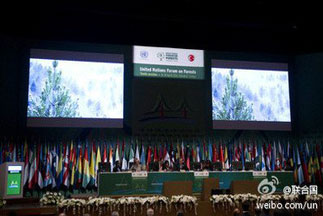
China Forestry Network May 11th Recently, at the 12th session of the United Nations Forum on Forests held in New York, USA, Zhang Songdan, the inspector of the Forest Resources Management Department of the State Forestry Administration and the Forest Resources Supervision and Management Office of the China International Forestry Corporation, was the rotating chairman of the Montreal Process. On behalf of the 12 member states of the process, the Montreal Process "Yanji Declaration" was issued. The 12 member states indicated that they will continue to work together to promote sustainable forest management in the temperate zone and the north and the world, and promised to carry out four activities in the future to actively promote global forest protection and sustainable forest management.
The Yanji Declaration, as a programmatic document of the Montreal Process, is the basic norm for the members of the process to promote sustainable forest management practices, technical exchanges and cooperation. The Yanji Declaration states that 12 member states are fully aware that the Montreal Standards and Indicators System is an important tool for promoting, implementing and demonstrating sustainable forest management, and the Global Sustainable Development Goals, the United Nations Forest Strategic Plan (2017-2030) The assessment and reporting of international commitments such as the Climate Change Paris Agreement and the United Nations Forest Instrument are closely linked. The 12 member states continue to work together to promote sustainable forest management in the temperate zone and in the north and around the world.
The 12 member states promised in the Yanji Declaration that they will do a good job in four aspects in the future: First, maximize the application of standards and indicator systems, and provide an efficient and flexible technical framework for policy formulation and related discussions. Cope with the challenges and problems in achieving sustainable forest management. The second is to improve the ability to monitor, assess and report on the environmental, economic and social contribution of forests, to meet the needs of various international reports in an open and transparent manner, to continuously strengthen the application of standards and indicator systems at the local and global levels, and to promote forests. Policy development and practical exploration of sustainable management. The third is to actively participate in the forest-related international process, learn from the experience of member states in the preparation of national reports, share best practices, analytical methods and new technologies, and use the standards and indicators system of the Montreal process to improve the consistency of forest authority information and reports. Achieve the ultimate goal of sustainable forest management. The fourth is to actively exchange and cooperate with other regional and multilateral forest and non-forest organizations to improve understanding and understanding of sustainable forest management policies, practices and reports.
The Montreal Process was established in 1993 as an intergovernmental technical forum. What are the main commitments of international conference companies to monitor and report on the status of temperate and boreal forests through the development and use of sustainable forest management standards and indicator systems, and to promote regional and global forests. Continue to operate. The process consists of 12 member states including Argentina, Australia, Canada, Chile, China, Japan, South Korea, Mexico, New Zealand, Russian Federation, United States and Uruguay, including 60% of the world's forests and 90% of temperate and boreal forests. % of the population, 45% of global trade in wood forest products. China officially became a member of the Montreal Process in 1999 and actively participated in the activities and work of the working groups and technical groups of the process.
The Montreal Process issued the Santiago Declaration and the Quebec Declaration in 1995 and 2003 respectively. In order to adapt to the international community's constant demand for forests and their functions, the larger international conference companies in the country have strengthened the impact of the Montreal process on international initiatives such as the UN forest instruments and sustainable development strategies. Since 2015, the revision of the declaration has been initiated, 2016 8 At the 26th working group meeting held in Yanji City, Jilin Province, China, it was decided to complete the revision of the declaration as soon as possible. Thanks to the joint efforts of the member states, the Yanji Declaration was recently formed and approved and confirmed by 12 member governments. (Advocacy Office)
Website:http://www.jiuzhouplanning.com/EN/
Free Hotline: 400-819-1976
Mobile: +8613911354921
